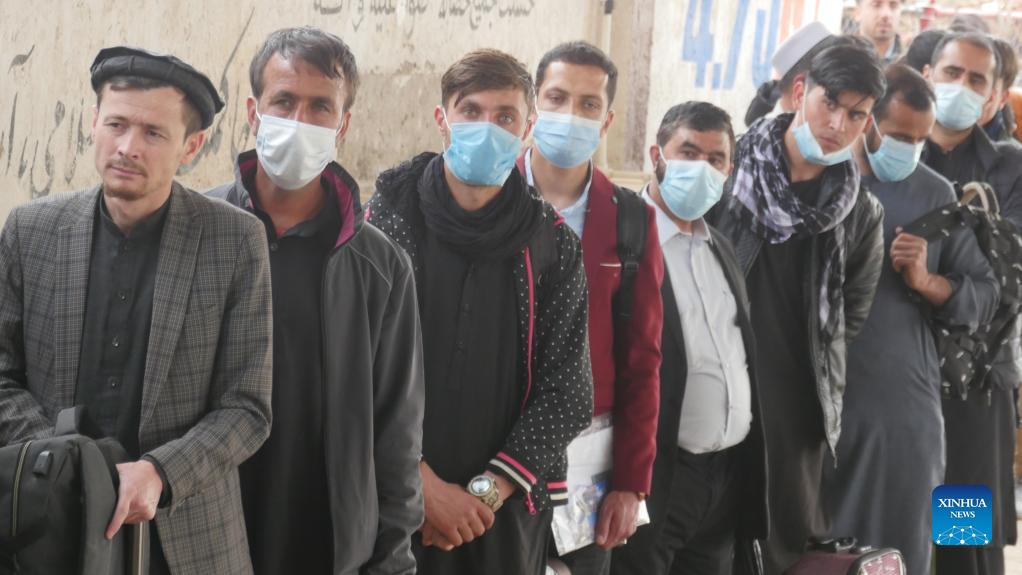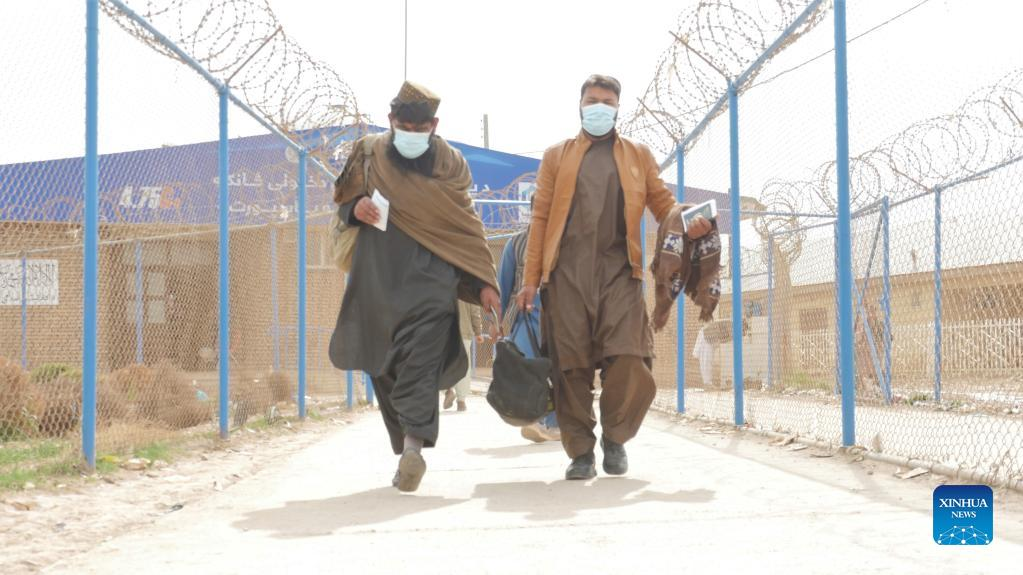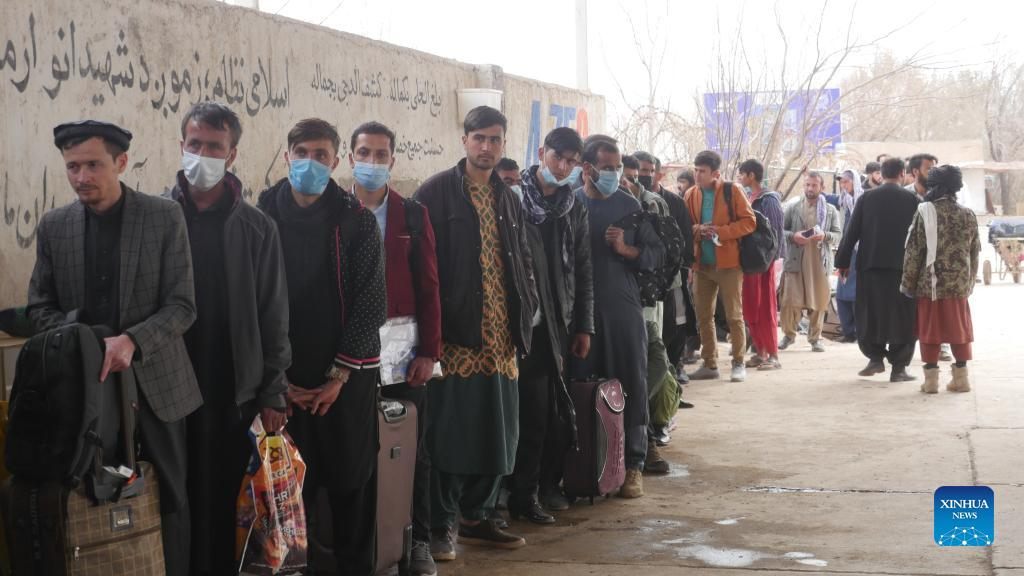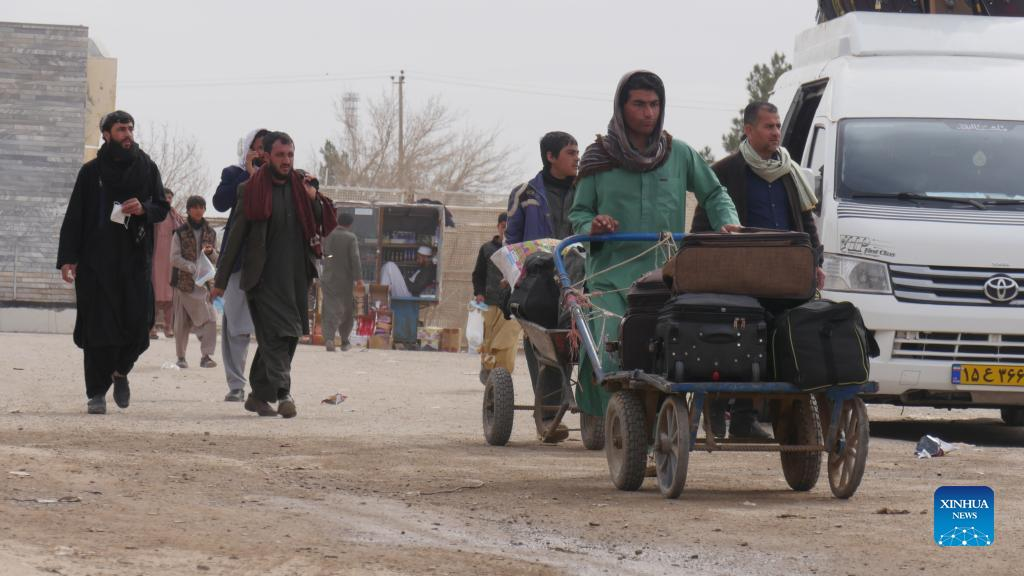Migrating Afghans wish for stable, prosperous motherland

Afghans stand in line to leave the country at Islam Qala, a town along the border with Iran in the western Herat province of Afghanistan, March 3, 2022. The U.S.-led coalition force's 20-year war in Afghanistan caused poverty and forced hundreds of thousands of Afghans to leave homeland. In the wake of the withdrawal of the U.S.-led forces in August last year, Washington imposed sanctions on Kabul's new rulers, freezing nearly 10 billion U.S. dollars worth of assets of Afghanistan's central bank, which further worsened the country's smashed economy and forced many Afghans to migrate for livelihood. (Photo by Mashal/Xinhua)
HERAT, Afghanistan, March 14 (Xinhua) -- The U.S.-led coalition force's 20-year war in Afghanistan caused poverty and forced hundreds of thousands of Afghans to leave homeland.
In the wake of the withdrawal of the U.S.-led forces in August last year, Washington imposed sanctions on Kabul's new rulers, freezing nearly 10 billion U.S. dollars worth of assets of Afghanistan's central bank, which further worsened the country's smashed economy and forced many Afghans to migrate for livelihood.
U.S. President Joe Biden in a decree in February moved 7 billion dollars of the frozen Afghan assets to fund humanitarian assistance to Afghan people and compensate victims of the 9/11 terror attacks.
The decision has been blasted by Afghans as unjust and illegitimate.
On Monday, a large number of children took to the streets in the western Herat city, condemning the U.S. for stealing Afghanistan's fund and calling on the international community to press Biden to unfreeze the assets.
Many Afghans are leaving homeland to immediate neighbors including Iran, which borders Herat province.
Mohammad Alam Amini is one of the destitute Afghans who has left his home in the northern Sari Pul province for Iran.
"We have nothing to eat. It is a daunting challenge, for which I left for Iran hopefully for one or two years, and then I will return home with full hands," Amini said.
Waiting at the Islam Qala crossing point, a border town connecting Afghanistan to Iran, Amini told Xinhua, "I wish that Afghanistan would become a stable and prosperous country one day and our people do not need to go abroad," Amini said.
Afghanistan has been facing poverty and high unemployment rate.
More than 22 million out of the 35 million population in Afghanistan, according to aid agencies, are facing acute food shortage.
Many infrastructures were destroyed during decades of war and the new administration in Kabul has been facing cash scarcity.
Some, however, seem optimistic about the future of the country.
"The security has been improved and criminal activities including theft, robbery, kidnapping and killing have drastically dropped down in Afghanistan and the future of the country seems promising," another Afghan migrant Barakatullah Gulzar told Xinhua at the border crossing point.
Having tourist visa, Gulzar, a resident of Herat province, said he is going to visit Iran for merely a few days and then return home.
Mawlawi Hamayon Humat, the deputy commissioner for Islam Qala border point, told Xinhua that the number of refugees has reduced due to improved security in Afghanistan.
"In the past years, between 3,500 to 4,000 Afghans crossed the border to Iran daily but the number has reduced to 1,500 nowadays due to the improved security and increasing optimism about the future," Humat said.

Migrating Afghans are seen at Islam Qala, a town along the border with Iran in the western Herat province of Afghanistan, March 3, 2022. The U.S.-led coalition force's 20-year war in Afghanistan caused poverty and forced hundreds of thousands of Afghans to leave homeland. In the wake of the withdrawal of the U.S.-led forces in August last year, Washington imposed sanctions on Kabul's new rulers, freezing nearly 10 billion U.S. dollars worth of assets of Afghanistan's central bank, which further worsened the country's smashed economy and forced many Afghans to migrate for livelihood. (Photo by Mashal/Xinhua)

Afghans stand in line to leave the country at Islam Qala, a town along the border with Iran in the western Herat province of Afghanistan, March 3, 2022. The U.S.-led coalition force's 20-year war in Afghanistan caused poverty and forced hundreds of thousands of Afghans to leave homeland. In the wake of the withdrawal of the U.S.-led forces in August last year, Washington imposed sanctions on Kabul's new rulers, freezing nearly 10 billion U.S. dollars worth of assets of Afghanistan's central bank, which further worsened the country's smashed economy and forced many Afghans to migrate for livelihood. (Photo by Mashal/Xinhua)

Afghan men leave the country at Islam Qala, a town along the border with Iran in the western Herat province of Afghanistan, March 3, 2022. The U.S.-led coalition force's 20-year war in Afghanistan caused poverty and forced hundreds of thousands of Afghans to leave homeland. In the wake of the withdrawal of the U.S.-led forces in August last year, Washington imposed sanctions on Kabul's new rulers, freezing nearly 10 billion U.S. dollars worth of assets of Afghanistan's central bank, which further worsened the country's smashed economy and forced many Afghans to migrate for livelihood. (Photo by Mashal/Xinhua)

An Afghan woman holds her child as she leaves the country at Islam Qala, a town along the border with Iran in the western Herat province of Afghanistan, March 3, 2022. The U.S.-led coalition force's 20-year war in Afghanistan caused poverty and forced hundreds of thousands of Afghans to leave homeland. In the wake of the withdrawal of the U.S.-led forces in August last year, Washington imposed sanctions on Kabul's new rulers, freezing nearly 10 billion U.S. dollars worth of assets of Afghanistan's central bank, which further worsened the country's smashed economy and forced many Afghans to migrate for livelihood. (Photo by Mashal/Xinhua)

Afghans stand in line to leave the country at Islam Qala, a town along the border with Iran in the western Herat province of Afghanistan, March 3, 2022. The U.S.-led coalition force's 20-year war in Afghanistan caused poverty and forced hundreds of thousands of Afghans to leave homeland. In the wake of the withdrawal of the U.S.-led forces in August last year, Washington imposed sanctions on Kabul's new rulers, freezing nearly 10 billion U.S. dollars worth of assets of Afghanistan's central bank, which further worsened the country's smashed economy and forced many Afghans to migrate for livelihood. (Photo by Mashal/Xinhua)

Migrating Afghans are seen at Islam Qala, a town along the border with Iran in the western Herat province of Afghanistan, March 3, 2022. The U.S.-led coalition force's 20-year war in Afghanistan caused poverty and forced hundreds of thousands of Afghans to leave homeland. In the wake of the withdrawal of the U.S.-led forces in August last year, Washington imposed sanctions on Kabul's new rulers, freezing nearly 10 billion U.S. dollars worth of assets of Afghanistan's central bank, which further worsened the country's smashed economy and forced many Afghans to migrate for livelihood. (Photo by Mashal/Xinhua)
Photos
 Traditional tie-dye products of Buyi ethnic group in Guizhou popular among tourists
Traditional tie-dye products of Buyi ethnic group in Guizhou popular among tourists Girls from mountainous areas in Hainan pursue football dreams
Girls from mountainous areas in Hainan pursue football dreams Chinese artist forms elaborate images using whisked tea foam in revival of Song Dynasty’s cultural splendor
Chinese artist forms elaborate images using whisked tea foam in revival of Song Dynasty’s cultural splendor Wild lilies in full bloom as snow melts in Xinjiang
Wild lilies in full bloom as snow melts in Xinjiang
Related Stories
- Commentary: Plundering of Afghan assets by Americans is blatant theft
- U.S. misappropriation of Afghan assets inhumane: Chinese envoy
- Feature: Afghan victims of U.S. "war on terror" still suffer
- Emergency experts call for urgent humanitarian aid in Afghanistan: UN
- China urges U.S. to return assets to Afghanistan
Copyright © 2022 People's Daily Online. All Rights Reserved.






